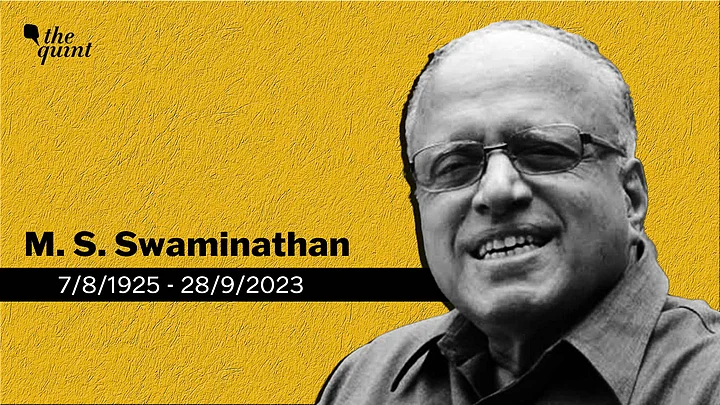It is an end of an era in Indian agriculture with the passing away of Dr Monkombu Sambasivan Swaminathan. His profound contribution to India's food security have left an indelible mark on the nation, earning him the well-deserved title of the "Father of the Green Revolution".
As India was reeling under poverty and food shortage in the 1960s and 1970s, Dr Swaminathan pioneered the Green Revolution in India. The advent of high-yielding crop varieties, particularly those for rice and wheat, signalled a paradigm shift in Indian agriculture.
Dr Swaminathan's influence in this area is tremendous because his life and work were devoted to ensuring that no Indian would go hungry.
His crucial involvement in introducing and supporting high-yielding crop types, such as wheat and rice, during the Green Revolution in the 1960s and 1970s was instrumental. With the help of these enhanced varieties, crop yields significantly rose, and India's food production became self-sufficient.
Championing Farmers, Sustainability, and Food Security
As the nation moved from chronic food shortages to surplus production, his goal of a food-secure India came to pass.
The research conducted by Dr Swaminathan went beyond crop variety. He understood the importance of sustainable agriculture for long-term food security. He pushed for adopting cutting-edge agricultural practices, such as mechanisation, efficient irrigation techniques, and the prudent application of pesticides and fertilisers.
His direction and leadership shaped India's agricultural policy and helped the nation's agriculture experience exceptional growth.
Swaminathan had an unflinching dedication to the welfare of Indian farmers. Dr Swaminathan thought it was important to provide farmers with information and tools so they could lead India's agricultural transformation.
His "Farmers' Friend" concept reflected his profound appreciation for agriculture's role in the nation's food security.
His voice was heard strongly in favour of environmentally-friendly farming methods as the globe struggled with the problems of sustainable agriculture and environmental conservation as he emphasised on the necessity of balancing and boosting agricultural productivity and protecting the environment for future generations.
Dr Swaminathan has received praise from all around the world and various honours, including the World Food Prize. His lifetime's labour has not only reduced hunger and poverty but also stimulated agricultural growth worldwide.
Therefore, it is crucial to keep Dr Swaminathan's goal in mind and carry on his legacy as the country mourns his passing. His commitment to ensuring food security for all Indians continues to be a source of inspiration and a reminder that advancements in agriculture are not just about increasing yields but also about enhancing lives and safeguarding a country's future.
The Agricultural Visionary’s Legacy of Food Security in India
Swaminathan's pursuit of education was the first step on his path to becoming a well-known agricultural scientist. He graduated with a Bachelor of Science in Agricultural Science from the Madras Agricultural College before attending Cambridge University in the UK and the Indian Agricultural Research Institute (IARI) in New Delhi to further his education. His scholastic accomplishments were the cornerstone for a career in agricultural research and development.
His research introduced him to new kinds of seeds which were more resilient and able to tolerate various environmental stresses in addition to being more prolific.
Dr Swaminathan aimed to reduce food shortages and enhance Indian farmers' standard of living. He pushed for contemporary farming methods, such as enhanced fertilisers, irrigation, and seeds. His efforts were crucial in raising agricultural productivity, making food production in India self-sufficient, and converting the country from one with a food deficit to one with surplus production.
Seeds of Progress and Sustainability
Several noteworthy features distinguish the work of Dr Swaminathan. First, via his partnership with international agricultural specialists, high-yielding crop types adapted to Indian circumstances were created and introduced. Developing well-known wheat varieties like "Kalyan Sona" considerably increased India's wheat output.
Secondly, Dr Swaminathan promoted the use of science and technology in agriculture, pushing for implementing mechanised farming and improved irrigation systems that were crucial in increasing agricultural production.
Last but not least, he changed his focus to sustainable agriculture in later years, emphasising the importance of preserving natural balance.
Swaminathan’s Global Impact: Honors, Influence, and Lasting Inspiration
Numerous honours and prizes have been bestowed upon Dr Swaminathan in recognition of his commitment and vision, including the World Food Prize in 1987 and the Indira Gandhi Prize for Peace, Disarmament, and Development in 1999. His support for sustainable agriculture, rural development, and food security has influenced agricultural policies in India and worldwide.
His legacy continues to serve as a source of inspiration and optimism for those tackling agriculture's ever-evolving problems.
(Anjal Prakash is a Clinical Associate Professor (Research) at Bharti Institute of Public Policy, Indian School of Business (ISB). He teaches sustainability at ISB and contributes to IPCC reports. This is an opinion article and the views expressed are the author’s own. The Quint neither endorses nor is responsible for them.)
